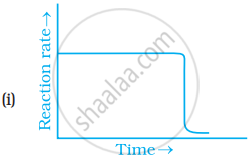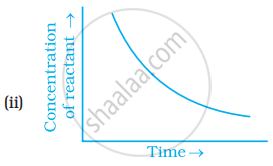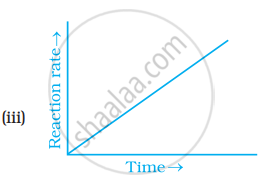Advertisements
Advertisements
प्रश्न
Which of the following graphs is correct for a zero order reaction?




उत्तर


Explanation:
A Zero order reaction = `[R] = (-k)t + [R]_0`
`y = (m xx x) + c`
x = t(time)
y = [R] concentration
Slope(m) = `- k`
Intercept(c) = `[R]_0`
`([R] - [R]_0)/t = -k`
`([R] - [R]_0)/t = -kt^0`
Rateαt0
APPEARS IN
संबंधित प्रश्न
The decomposition of NH3 on a platinum surface is a zero-order reaction. If the rate constant (k) is 4 x 10-3 ms-1, how long will it take to reduce the initial concentration of NH3 from 0.1 M to 0.064 M?
For which of the following reaction the units of rate constant and rate of the reaction are same?
At high pressure the following reaction is zero order.
\[\ce{2NH3(g) ->[1130 K][Platinum catalyst] N2(g) + 3H2(g)}\]
Which of the following options are correct for this reaction?
(i) Rate of reaction = Rate constant.
(ii) Rate of the reaction depends on concentration of ammonia.
(iii) Rate of decomposition of ammonia will remain constant until ammonia disappears completely.
(iv) Further increase in pressure will change the rate of reaction.
Write the rate equation for the reaction `2A + B -> C` if the order of the reaction is zero.
A solution with initial concentration of a mol dm-3 follow zero order kinetic. The time taken for the completion of reaction is
Consider the following statement:-
(i) Increase in concentration of reactant increases the rate of a zero-order reaction.
(ii) Rate constant k is equal to collision frequency A if Ea = 0
(iii) Rate constant k is equal to collision frequency A if Ea = 0
(iv) In k vs t is a straight line
(v) In k vs 1/T is a straight line
Which of the above statement is correct?
For a zero-order reaction, the plot of [A]t vs t is linear with a ______
What is zeroth order reaction? Derive its integrated rate Law. What are the units of rate constant?
Write the unit of rate constant of zero order reaction.
If unit of rate constant is mol dm−3s−1, the order of reaction would be ______.
